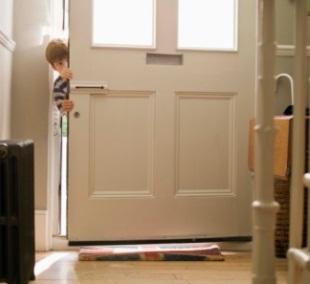Mental Illness and Family Dynamics (the Odd Man Out)

Mental illness messes with the family dynamic, and the mentally ill child can become the odd man out. Recently, Bob came home after spending a week at his father's house. There were no ticker-tape parades or confetti. We usually try to keep his returns low-key because of his problems with transitions, but last night felt different, because I'm not sure any of us were too excited about his homecoming.
Sounds horrible, doesn't it? Your child is gone for a week, and when you think about him coming home, you feel--dread? To make matters worse, your husband is even less thrilled about the homecoming than you, and when you ask your 3-year-old if he wants his big brother to come home, he says "no."
I thought it was just the length of time--he's never been away that long--but within an hour or so of him being back, it was clear: Bob is an outsider in his own home.
Personalities, Mental Illness and Family Dynamics
 I suppose I could hold our basic personality differences partially responsible. If my husband and youngest child were colors, they would be blue. I would be purple. Bob would be blazing fire-engine red.
I suppose I could hold our basic personality differences partially responsible. If my husband and youngest child were colors, they would be blue. I would be purple. Bob would be blazing fire-engine red.
Bob is always "ON", whereas his brother and stepfather are laid-back almost to the point of catatonia. (I fall somewhere in between, but closer to the blue side than the red.) Having him around often feels like wearing roller skates in a china shop--everyone is on edge.
Living with Someone with a Mental Illness Is Hard Too
There's also the fact Bob hasn't done much lately to garner a warm reception. We know he has a legitimate illness, but the fact remains he has been an absolute nightmare to live with the past several months. Mouthy, cranky, insolent, and downright hateful--and that's if I'm being polite. Even though we know there's a limit to his control over his own behavior, it doesn't make the pill any easier to swallow. It's hard to live with a mental illness--I'm very well-aware--but sometimes it's even harder to live with the person living with the mental illness. When he left last week, I think the three of us left behind were largely . . . relieved.
Bob didn't give any indication he knew the big white elephant in the room was him, but I'm sure he has some idea. (Although his social skills are so poor, he may be completely oblivious.) I almost hope he doesn't get it. Because the last thing I want is for him to feel like he doesn't belong--especially in the place where he's supposed to belong, no matter what.
APA Reference
McClanahan, A.
(2011, June 24). Mental Illness and Family Dynamics (the Odd Man Out), HealthyPlace. Retrieved
on 2026, January 30 from https://www.healthyplace.com/blogs/parentingchildwithmentalillness/2011/06/odd-man-out-mental-illness-and-family-dynamics
Author: Angela McClanahan
I think that internally the child hates giving his or her parents such a difficult time. They wish that they were happy just like anyone wants to be happy. They do not know how to fix what is wrong. Whatever a family feels, I think that the child feels worse. It is so hard for us to not take offense or recoil from attacks. We have to constantly remember that it is an illness and we can not blame them for it. We do however need to set FIRM boundaries for behavior to see what we can expect. Too often we are bullied into a corner and pushed away from reasonable expectations. All that breeds is hopelessness in us and in our child. It is really important to forgive and forget and move on constantly. Never go to bed angry. Pray with your child and forgive your child. Comfort your child. This is really really hard when you have been attacked especially when your child is older because it is so pronounced and hard to excuse. You have to get a break, even if your child mistreats you for it, and takes it as a sign you do not love them. You may be looked upon as the only one who gives them love and acceptance, and the only one who is there for them. When you go out or get a break they may feel abandoned and panic. Scedules and dependability helps. Reassurance that you love them helps. Reasonable expectations and boundaries help. If you have not had any requirements for their behavior then you have to build up to a reasonable level slowly. Small steps will get you closer to where you want to be in functioning as a family. Consistency is important in establishing a secure environment for your child. That always comes first. Pointing out that you can argue and get upset and that happens in all families, but that you love one another, forgive one another and move on to try to do better each and every day. That gives us and them hope and courage. Prayer with your child can really help because it gives hope for change. Doing special things with and for your child let's them know that you love them no matter what. You are pretty much what stands between them and despair and giving up. Involve other family because they tend to stay away. Don't let them get away with that. Ask for structured family visits around an activity that will be guaranteed for a good time for all. Don't force family to interact with your impaired loved one because your loved one will feel their resentment. Try to help them make good friends and have some fun. Sometimes we are so much about our business and we are withdrawn from the troubled one emotionally. This really is destructive to a supportive relationship. When a mentally ill child or any child feels like they are a burden and not loved, they will act out more in an attempt to get the attention they need. If demands are too great they will act out a lot. It is okay to change your expectations and back off and give a child time to take self control. Unfortunately, with mentally ill people, it can take a longer time. How can you help the young child take self control. They can be involved in figuring out a plan for what to do when they are stressed and beginning to have a melt down in order to lessen it's severity or avoid it occurring entirely. Don't give up. And find trustworthy people to share their care and pamper them and physical activities for them to engage in to decrease stress levels, and deal with emotions. Most of all forgive yourself for not being the perfect parent. Apologize to your child quickly when you need to and make up for your short comings. Let them know you care in big and little ways. A simple hug can mean so much. Keeping your promises can be like gold. Tell yourself that life will not always be so difficult. Sing to yourself. Practice being thankful and counting your blessings. If you are a Christian, sing praise songs to God because that catches God's ear and the word of God says that he lives in the praises of His people. Live a life of reading His word, and prayer, depending upon Him for strength, and wisdom for daily life. Keep good friends who really listen and care about you. Have a life outside your children and your problems! Enjoy something! Keep your family informed about your struggles, because if you do not tell your family and friends what is going on they do not get a chance to care or help. Don't be afraid to ask for specific help either. Never give up. There is no way our but through. Love covers a multitude of sins is what the Bible says.......it means that it makes a lot of irregular and messed up things okay, because we just do not notice them or forgive them freely as we have been forgiven by Christ. God Bless. They read us like a book, we can not hide our frustrations from our children.
Wow, this really hits home for me! My daughter just got back after 9 days gone and it's already back to walking on egg shells. I hate feeling this way about my own child.
Reading your post describes how my family feels about my son. There is so much that I could write but your story resonates with me and its comforting to know that my feelings are normal.
As a mother of a 12 yr old girl not yet diagnosed with bipolar (but the more I read, the more I'm convinced) I often allow similar thoughts to "leak out" to friends, only to be made to feel monstrous at the end of it all. My daughter, you see, has two identities: one for her family (be it inside or outside our home's boundaries, and one for her friends, teachers and people she associates with. This is so frustrating and isolating and the frankness of your words above feels soothing, at long last! We have been tiptoeing around her and her "high maintainance" for 12 years and feel heavy and worn. We love her to death but most of our waking hours are a struggle for survival. Thanks for the work you're putting out there. N.M.